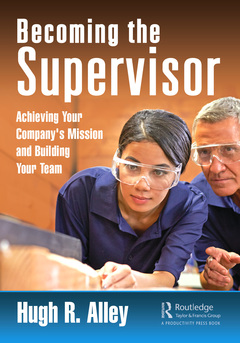Description
Becoming the Supervisor
Achieving Your Company's Mission and Building Your Team
Author: Alley Hugh R.
Language: English
Subjects for Becoming the Supervisor:
Keywords
Job Instruction Breakdowns; Packaging Issue; supervisory skills; Sunil; working competency; Great Winter; listening; Wo; communicating; Follow; front-line leadership skills; Wandering; Ok; Drill Press; Rocky; Odd; Paused; Blossomed; Stretch Wrap; Rough Sanding; Guest Chairs; Cabinet Shop; Breakdowns; Sick; Morning; JM; Training Matrix; Rough Finishing; JM; Shipping Label
Publication date: 05-2020
· 17.8x25.4 cm · Paperback
Publication date: 05-2020
· 17.8x25.4 cm · Hardback
Description
/li>Contents
/li>Readership
/li>Biography
/li>
Becoming a Supervisor tells the story of Trevor who works as one of the production team in a small company that makes toy boats. He is thrust into the role of supervisor unexpectedly when his general manager reacts to his constant suggestions of how things could be better. When the GM becomes ill, Trevor struggles to take up the slack for several months until a new GM arrives. The core of the book follows Trevor?s growth under the coaching of Julie, his new GM. As Trevor deals with one challenge after another, Julie guides him on a journey to learn the core skills needed by all front-line leaders.
The reader takes away four key ideas: (1) Front-line leadership skills are not too complicated to learn. (2) These skills are something that they can develop in themselves, regardless of what their organization does. (3) Tools and skills are there to help solve real business problems; implementing the tools is not a strategy. (4) In your role as supervisor (directing or responsible for others) you have to look after the mission of the company AND look after your people ? doing only one is not an option.
Essentially, this book is intended to give hope to a new supervisor or team lead. They will finish the book knowing that the skills they need can be learned and aren?t that difficult to acquire. It is designed to introduce the central skills that any supervisor has to be able to master at least with a basic working competency: instructing, leading, and making improvements in their own area. It introduces some of the more widely used tools that a new supervisor may need. More importantly, it ties these tools and skills to solving particular problems. Readers will understand that the tools are not important for their own sake, but only to the extent that the tools serve the larger objective of the organization.
This book is designed to give the reader an entertaining and hopeful story about the very difficult transition from worker to supervisor, from being one of the crew to directing the crew. It is an emotionally tough transition, and the idea that someone could see a model of how it can work out will be helpful to folks new in a leadership role. Finally, the book provides a reference to other sources of information that will let the reader extend their learning about each of the tools or skills referenced in the contents.
List of Figures. List of Tables. Preface. Acknowledgements. About the Author. Chapter 1 You Be The Supervisor. Chapter 2 The First Four Months. Chapter 3 A New Boss. Chapter 4 The First Meetings. Chapter 5 The Observations. Chapter 6 The Morning Meeting. Chapter 7 He Quit – Learning to Instruct. Chapter 8 Making Improvements. Chapter 9 Improvements in My Area. Chapter 10 The Problem Child. Chapter 11 The Accident. Chapter 12 Collisions. Epilogue.
Hugh R. Alley, P.Eng., is president and founder of First Line Training Inc. The company helps clients improve productivity and profits by building the skills of managers and supervisors. Hugh is an industrial engineer and has worked for over 25 years in a wide range of manufacturing settings. He has been a manager, a consultant, and a business owner. He has helped many organizations make significant gains in productivity.
Hugh has trained over 900 supervisors and front-line leaders. He has run three different manufacturing firms, including several distribution centers. He has either designed or helped with the design and fit-out of almost a dozen factories and distribution centers.
Prior to starting First Line Training in 2011, Hugh was Operations Manager and part owner of a manufacturing firm in Langley with 70 – 120 employees. Over 3 years the company reduced its lead time by 25%, its accident rate by 95%, and saw measured gains in productivity of 10 - 12% per year. Before that he worked as part of Grant Thornton LLP’s manufacturing and distribution consulting practice. He spent five years working with the WCB of BC in a range of roles including managing staff development, managing a claims unit and running several large projects. Prior to joining the WCB he spent five years running his own consulting industrial engineering firm.
Hugh has experience in a wide range of industries, including steel fabrication, pharmaceuticals, secondary wood manufacturing, mining, steel, wire, food processing, electronics assembly, appliance assembly, furniture, engineered wood products, yacht building, electrical transmission and others. In the public sector he has worked in education (public and post-secondary), health care, transportation, maintenance and employment standards.
Hugh obtained his B.A.Sc. at University of Waterloo (Systems Design Engineering) and earned an M.Sc. in resource economics at Cornell, and a Master of Divinity at Vancouver S




